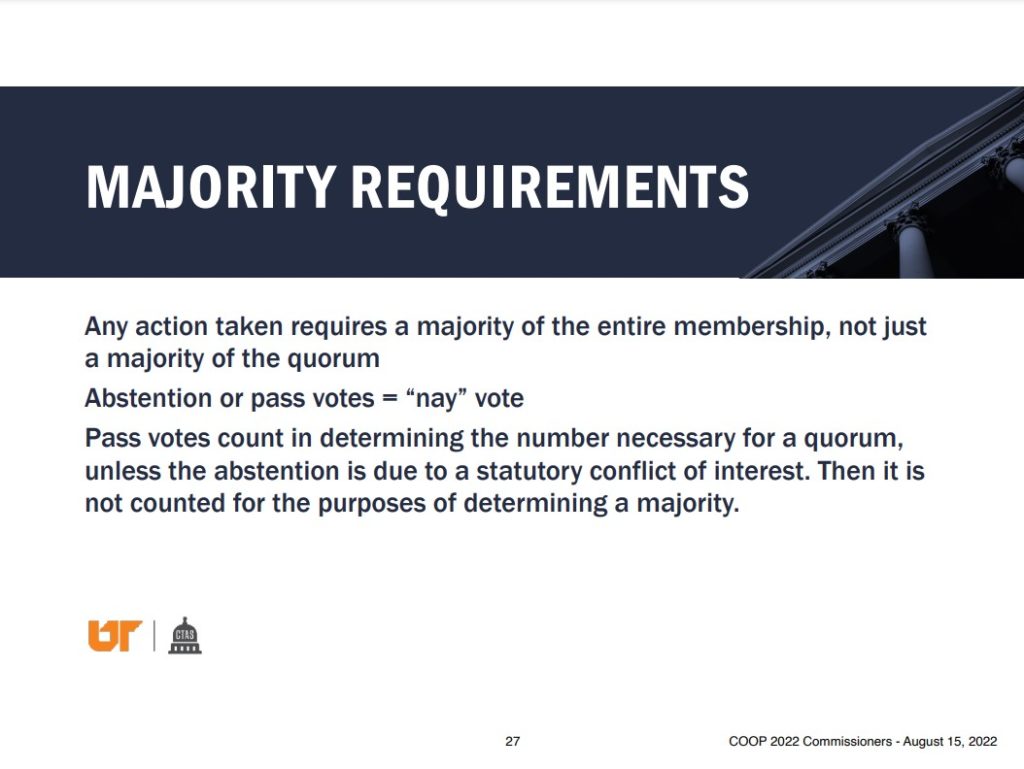Earlier this week, several commissioners abstained during votes on three proposed ordinances dealing with the Shelby County Sheriff’s office.
This has caused several to ask, what’s that all about? Why don’t these commissioners simply vote yes or no? And if they abstain, are they really doing their jobs?
Here’s one example:
“Why all the abstinence votes, and does it count either way?”
It looks like a simple question, but the answer is complicated.
Actually, I have three answers.
First, there are several ways elected officials can vote, but only one option really matters: voting yes.
Resolutions, ordinances and other motions require a majority of members voting yes in order to pass. Everything else counts as a no vote, as shown in this slide from CTAS.

The formal voting options are: yes, no, abstain and recuse. And sometimes a legislator may not cast a vote at all, due to an absence, or if they are present but choose not to vote.
Everything other than yes is a no. No means no. Abstaining is a no. Being absent is a no. Present not voting is a no. And even a recusal (for a conflict of interest) is a vote that isn’t a yes, which makes it equivalent to a no.
Of course, voting no has significance beyond how it influences the passage or failure of a motion. But from a functional perspective, all that matters is how many yes votes are cast, and whether or not the yes votes constitute a majority.
Second, some votes are functionally meaningless, and officials might choose to abstain until the vote actually counts.
For example, committee votes. Nothing is made final in committee, so votes cast there are merely recommendations for or against ultimate passage in a future meeting of the full commission.
We can still attach significance to committee votes, but they aren’t the final word.
Similarly, ordinances have to be approved on third reading in order to pass. So any vote that takes place on the first and second reading, and also in committee three times prior to the third reading, is irrelevant from the perspective of actually enacting legislation.
Third, I don’t know. I can’t say why anyone else votes like they do. I can only offer my own perspective.
If I could monitor what takes place inside my colleagues’ heads, and if I knew what motivates and inspires their choices, I could use that information to sway them to my point of view.
Sadly, I don’t have that superpower. But I can share a few reasons why I have abstained from certain votes.
Votes to abstain should be few and far between, but there are times when I have found abstaining to be the best available option.
Such occasions include when:
- I don’t know enough to intelligently cast a yes or a no vote, especially at times when a resolution has just been introduced and I have not had an opportunity to read it, or when there are questions that have not been answered.
- I am not confident that something should pass, but where active opposition isn’t exactly appropriate, either.
- The passage and failure of a resolution may have equally unwelcome consequences.
- The board should not be voting on the subject in the first place, because it is outside of the board’s scope of authority, or for similar reasons.
- The resolution or ordinance is meaningless, and the vote itself is a waste of time.
Those are reasons why I have voted to abstain at various times in the past. But such examples are the exceptions, not the rule.
In our present situation, the only appropriate vote is “no.”

